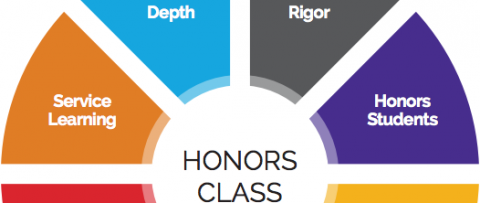Thinking about joining a college honors program? Make sure you know what you’re getting into before saying “yes.”
Not all honors programs are created equal. A good honors program will provide an honors-level education - and that means classes of an entirely different caliber.
That can sound intimidating, which is why one of the first questions that most students ask about American Honors is: “What’s the difference between a typical class and an honors course?”
In our case, these are students evaluating whether to go to community college or not, so the answer is pretty important.
The thing is, there are lots of definitions for “honors,” and various programs focus on different aspects. Here’s how National Collegiate Honors Council defines honors:
“Honors education is characterized by in-class and extracurricular activities that are measurably broader, deeper, or more complex than comparable learning experiences typically found at institutions of higher education. Honors experiences include a distinctive learner-directed environment and philosophy, provide opportunities that are appropriately tailored to fit the institution’s culture and mission, and frequently occur within a close community of students and faculty.”
This can be a helpful definition for academics, but what does it actually mean when you’re a student?

Want the FULL scoop? Download our FREE graphic - '8 Essential Elements of an Honors Class.'
4 Ways Honors Classes Are Different
I can’t speak for every honors program out there, but there are some common hallmarks of a great honors class. There’s a safe bet that if you’re accepted to an honors program, you can look forward to a classroom with these four unique qualities.
1) Reversed Classrooms
A reversed classroom frees students from the typical lecture-based format. That means instead of having someone talk at you about course material, you get to discuss big ideas and important questions together.
"Honors students spend valuable class time wrestling with dificult questions."
This style of learning works because students read their assignments before class, so they can spend valuable class time wrestling with difficult questions, debating important points, and working through activities or simulations.
This is called a flipped classroom model. It happens to be one of the 8 core elements of an American Honors class, but it's common in many other honors programs, too.
2) Sophisticated Materials
A giant wall of notes on the screen? No fun.
A great classroom discussion can be facilitated by great teaching materials. Ever had a professor display a giant wall of notes on the screen and then simply read them out loud? No fun, right? That’s where better teaching materials can come into play.
Heres an example: when designing a recent history class, an American Honors professor adapted non-ADA compliant powerpoint slides to online “magazine” style pages that included relevant images and links to external resources for enhanced content. Students could actually explore the info on their own.
Honors faculty tend to share teaching methods. The professor from our example shared that material with American Honors faculty at every community college in the network. Honors communities tend to be supportive for everyone.
3) Hands-on Learning
Not everybody learns best just by talking through ideas, or even reading them. Sometimes you have to get your hands dirty and really experience something to understand it.
"Sometimes you have to experience something to understand it."
Here is a super fun example from an American Honors political science course this semester. Students enact a foreign policy simulation by role-playing as leaders of different countries. The simulation takes place over the course of several weeks while the professor writes fictional news updates based on current events. Students get to discuss the news and make decisions based on how they (and their country) would react.
Hands-on learning can be a lot of fun, but it’s also a way to geek out - which just might be what college is all about in the first place.
4) Quality Over Quantity
An honors education is about depth.
Ever felt like you were assigned homework just for the sake of giving you something to do? Fortunately, that doesn’t happen in honors classes.
That’s because an honors education is about depth. We’re not interested in assigning busywork to students. Instead, Honors classes help students attend to their learning in deeper ways--be it using different critical perspectives and theoretical lenses or through hands-on assignments that access multiple intelligences.
Heavy stuff. But so worth it! And weirdly fun, once you get into it.
Honors classes can sound intense. But don’t worry. Remember: if you got accepted, then you’re qualified.




